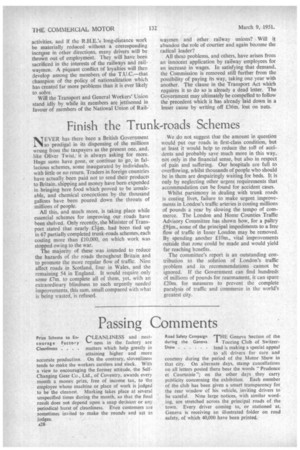Finish the Trunk-roads Schemes
Page 30

If you've noticed an error in this article please click here to report it so we can fix it.
NEVER has there been a British Government so prodigal in its dispensing of the millions wrung from the taxpayers as the present one, and, -like Oliver Twist; it is always asking for more. Huge sums have gone, or continue to go, in fallacious schemes, some inaugurated by individuals, with little or no return. Traders in foreign countries have actually been paid not to send their products to Britain. shipping and money have been expended in bringing here food which proved to be unsaleable, and chemical concoctions by the thousand gallons have been poured down the throats of millions of people.
All this, and much more, is taking place while essential schemes for improving our roads have been shelved. Only recently, the Minister of Transport stated that nearly £3m. had been tied up in 67 partially completed trunk-roads schemes, each costing more than £10,000, on which work was stopped owing to the war.
The majority of these was intended to reduce the hazards of the roads throughout Britain and to promote the more regular flow of traffic. Nine affect roads in Scotland, four in Wales, and the remaining 54 in England. It would require only some £7m. to complete all of them, yet, with an extraordinary blindness to such urgently needed improvements, this sum, small compared with what is being wasted, is refused. We do not suggest that the amount in question would put our roads in first-class condition, but at least it would help to reduce the toll of accidents and probably save much more in this way, not only in the financial sense, but also in respect of pain and suffering. Our hospitals are full to overflowing, whilst thousands of people who should be in them are despairingly waiting for beds. It is only by neglecting other urgent requirements that accommodation can be found for accident cases.
Whilst parsimony in dealing with trunk roads is costing lives, failure to make urgent improvements in London's traffic arteries is costing millions of pounds a year by slowing the tempo of commerce. The London and Home Counties Traffic Advisory Committee has shown how, for a paltry some of the principal impediments to a free flow of traffic in Inner London may be removed. By spending another £10m., vital improvements outside that zone could be made and would yield far reaching benefits.
The committee's report is an outstanding contribution to the solution of London's traffic problem and its recommendations cannot be ignored. If the Government can find hundreds of millions of pounds for rearmament, it can spare £20m. for measures to prevent the complete paralysis of traffic and commerce in the world's greatest city.




















































































